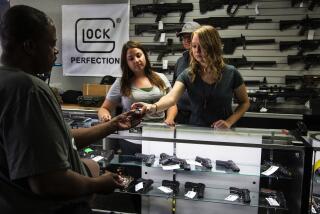New federal rules to keep guns from potentially violent mentally ill
The federal government on Friday announced it had drafted new rules aimed at keeping people who have been involuntarily committed to psychiatric treatment from buying guns. The Department of Health and Human Services said one proposed rule would “remove unnecessary legal barriers” to states reporting the names of patients involuntary admitted to psychiatric care.
Those names would enter the National Instant Criminal Background Check Systems -- NICS -- that would be used by most gun dealers as a condition of sale. Along with felons and people convicted of domestic violence, a patient involuntarily committed to a mental institution would be flagged during a background check initiated by a gun retailer, and the sale would be blocked.
The new rules also aim to boost states’ reporting of two other categories of people prohibited from buying or owning firearms: those legally determined to be a danger to themselves or others, and those who lack the mental capacity to manage their own affairs.
The proposed new federal rule would loosen certain provisions of the Health Insurance Portability and Accountability Act, which imposes stringent patient-privacy restrictions on healthcare providers. The provisions proposed for relaxation would allow state authorities to collect the names of patients involuntarily committed to psychiatric care, and then forward them to the federal clearinghouse.
The new rule also expands the population of those committed involuntarily to psychiatric care who would be prohibited from buying guns. While past language has limited that prohibition to those committed to inpatient care, the new rule would call on states to report to NICS the names of those committed involuntarily to outpatient psychiatric care as well.
Had it been in place in April 2007, this new reporting category would have included Seung-hui Cho, the Virginia Tech senior whose shooting rampage took 33 lives, including his own. Having been adjudicated as mentally unsound in a Virginia Court, Cho would have been put on the NICS list of prohibited gun buyers.
Currently, few states systematically collect and convey the names of those patients to the NICS, allowing gun sales to such buyers to proceed. A 2012 study by the Government Accountability Office reported that 17 states had forwarded to the NICS fewer than 10 records of individuals prohibited from buying firearms for mental health reasons.
But it’s not clear the new rule will increase the reporting of such patients to NICS, said one expert.
“The administration is removing that as an excuse,” said Dr. Paul Appelbaum, a Columbia University professor of psychiatry, medicine and law and a member of the American Psychiatric Assn. council on psychiatry and law. “I don’t think it will make a big difference,” he added.
The major obstacles to states reporting prohibited persons are logistical and budgetary, Appelbaum said. “There are many states with no central reporting of who has been hospitalized. A mechanism to put that into place would cost money, and many states have been reluctant to spend that money.”
Constitutionally, the federal government cannot enforce such reporting on states. It has offered funds and technical assistance to states that wish to build such reporting systems, but few have accepted. One exception is Virginia, where the district courts in which involuntary commitments are adjudicated are required to report names of the individuals to a centralized state office.
The proposed rule comes against the backdrop of calls for an expansion of the nation’s mental health safety net -- and along with it, a more accurate definition of those in and out of psychiatric care who are prone to violence.
Last month, the Consortium for Risk-Based Firearm Policy, a national group of researchers, practitioners and advocates in gun violence prevention and mental health, issued a report that recommended the extension of federal prohibitions on gun purchases and ownership to four groups not now covered: those convicted of a violent misdemeanor; those subject to a temporary domestic violence restraining order; those convicted of two or more driving-while-intoxicated or driving-under-the-influence charges over a five-year period; and those convicted over a five-year period of two or more misdemeanor charges involving a controlled substance.
In a report titled “Guns, Public Health & Mental Illness,” the consortium argued that ample research suggests that people in those four categories are at highly increased risk of engaging in violence, and that temporarily prohibiting them from buying or owning guns would save lives. At the same time, the group urged that restoration of such individuals’ right to buy or own firearms only come after a qualified clinician has determined the person is unlikely to relapse or become a danger to himself or others.
In a survey of 1,600 gun dealers, pawn brokers and gunsmiths released last September, UC Davis gun violence researcher Dr. Garen Wintemute found strong support for the extension of firearms-purchasing prohibitions to several groups: 70.7% support for restrictions on people with multiple DUI convictions; 97.4% for those with serious mental illness and a history of alcohol or drug abuse; 67.4% for those convicted of assault and battery not involving a lethal weapon or serious injury; and 91.2% for those with a serious mental illness but no history of drug or alcohol abuse.







